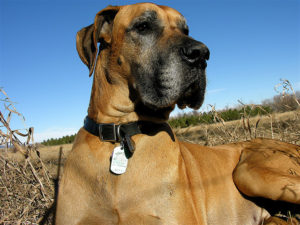It’s common knowledge that toy poodles can easily live to be 20, while Great Danes are luckily to see 8 or 9. But the question is, why? It makes owning these gentle giants so difficult, knowing that while all dogs’ lives are too short, theirs are way too short.
Dr. Denise Petryk, DVM, Trupanion’s Director of Veterinary Services was invited to attend a recent meeting of the Canine Longevity Consortium (CLC), a group created to better understand the biology of aging with domestic dogs and the potential to use the dogs as a model for human aging.
“A dog’s lifespan is determined by genetic and environmental factors, and research is currently being done to discover how each of those factors plays a role throughout a dog’s life,” explains Dr. Petryk. “Initial research on this subject shows that small dogs tend to age slowly and have better health throughout their lives, which naturally gives them a longer lifespan.”
Slow Aging

One of the keys the CLC has noticed is that, as Dr. Petryk says above, smaller dogs age slower than larger dogs. Of course, this means they will, for the most part, live longer. Put in perspective, the fruit fly develops (or ages) incredibly fast. Within 8-10 days of being alive they are ready to breed. There natural lifespan is 40-50 days.
In nature, the rule is, the quicker to age, the short the life.
“Previous research has also shown that small dogs tend to age slowly,” Says Dr. Petryk. “This essentially means a small-breed puppy will grow at a slower rate than a large-breed puppy, and this continues throughout their life. This has a lot to do with genetics, but the environmental impact will still play a large role.”
The Mystery Remains
But this still doesn’t answer the question why, in the same species, there would be such a difference? The oldest living dog is currently recorded as a cattle dog who lived to be 29 years of age (Guinness Book for World Records). That’s almost triple the age of most larger breeds.
The Canine Longevity Consortium is working cooperatively to establish a ground works for a nationwide Canine Longitudinal Aging Study. This type of study will potentially focus on following genetically related dogs in differing environments over long periods of time. Ultimately these types of studies will lead to a better understanding of why some dogs have longer lifespans.
Related: 7 Best Dog Treadmills
“A precise answer to the question ‘what is the biological basis for the long life span of small dogs’ remains elusive,” Dr. Petryk says. “What is clear however, is that some specific genes are much more important than others when it comes to healthy aging. Projects like the Canine Longitudinal Aging Study and the Old Grey Muzzle Tour 2013 are going to ultimately provide valuable insight into that relationship between genetics and home environments and there will one day be a concise answer to the question ‘Why do small dogs live longer?’”
About the Author
Based in Wilsonville, Ore., animal lover Kristina N. Lotz is a Certified Professional Dog Trainer – Knowledge Assessed (CPDT-KA) and works as a full time trainer. She also owns her own custom pet products company, A Fairytail House, where she makes personalized collars, leashes, beds, keepsake pillows and blankets, and anything else your imagine can think up. In her spare time, she trains and competes in herding, agility, obedience, rally, and conformation with her Shetland Sheepdogs. She smartly married a Veterinary Technician, who helps keep the fur kids happy and healthy, and provides a quick resource for articles.
